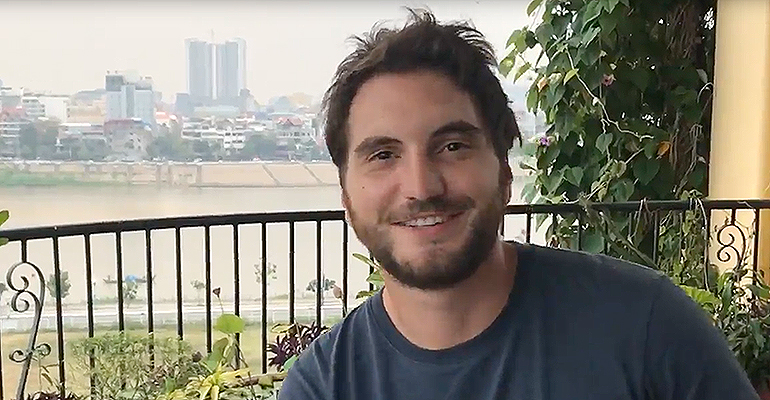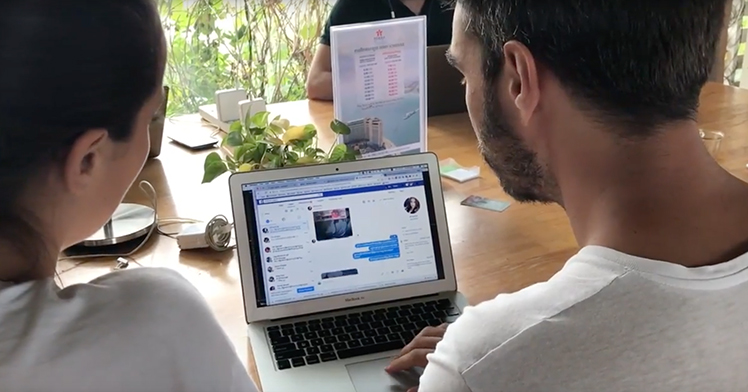With the rise of microfinance institutions (MFIs) in Cambodia, microfinancing is more accessible than ever. But the industry remains plagued with high interest rates, and borrowers can find themselves paying back more on their microloans than they bargained for.
A small four-man team of tech-enthusiasts believe they might have an answer to cutting interest rates on microloans across the Kingdom: a decentralised loan system backed by blockchain technology.
The team’s startup, called The DApact, relies on digitised processes to cut costs: initial funds are raised through crowdlending platforms as digital coin, loan underwriters are paid in cryptocurrency, and all transactions are backed by the Ethereum blockchain.
“The microfinance industry is booming in Cambodia, but risk aversion and high cost of operations drive up interest rates,” said Pierre-Marie Riviere, network lead at The DApact. “The high cost of microloans is an [elephant-in-the-room] problem, and the blockchain has great potential in addressing this issue.”

The blockchain is special in that it is a completely incorruptible ledger of transactions, meaning no person or group can artificially alter the information stored on it. Each time a transaction occurs on it, a network of nodes verifies it and an additional block of data is added to the ledger to reflect it – ensuring all payments made on the blockchain are secure.
According to Riviere, this technology has helped The DApact – which launched its first pilot in December last year – to begin offering microloans at a flat fee of 5% interest, far below the nation-wide interest cap of 18%.
The startup is able to offer these low rates by cutting costs that most MFIs are required to pay, including high interest rates on hefty bank loans. Rather than raise funds by applying for loans from international banks, The DAPact has turned to crowdlending via the internet, reaching out to hundreds of like-minded people who are willing to loan their cash–in the form of digital coin–at far lower rates than most banks.
“One of the main features of the blockchain technology is that it can send digital cash without need for a bank account, so you can send it to an unbanked person and provide a loan to that unbanked person,” he said. This is an important factor in Cambodia, with only 13% of the country’s population holding a bank account, according to a 2017 Asian Development Bank report.
Some people think microloans are expensive because it’s risky to loan to poor people, but it’s not risky
In order to disburse the raised digital funds as microloans, The DApact works through local recruited pawnshop owners. A seemingly odd choice for the startup, pawnshop owners in Cambodia are legally able to operate as loan underwriters, and are typically well known in their communities and able to collect collateral if need be.
Borrowers are able to take out hard cash from pawnshops and then pay their loans back in cash as well, but the pawnshop owners themselves are paid in digital tokens. Borrowers are given QR codes, and when they make payments on their loans, their QR codes are scanned and their smart wallets are loaded with coins. Lenders provide the initial loan in digital coin and are similarly paid back in digital currency.

Thus far, The DApact has given out 15 microloans, ranging from about $500 to $1000 each, through five participating underwriters in Phnom Penh. After four rounds of payments on these loans, the project has maintained a perfect 100% rate of return.
“Some people think microloans are expensive because it’s risky to loan to poor people, but it’s not risky,” said Riviere, adding that borrowers in the Kingdom have consistently been punctual in repaying their loans. “Cambodia’s non-performing loan rate (NPL) was just around 2% or 3% last year, which shows you that microloans are not risky investments.”
While the startup might be seen as a threat to MFIs that are unable to match The DApact’s low interest rates, Riviere said he hopes to work alongside Cambodia’s smaller MFIs in the future.
“We’re not exactly bypassing MFIs – in fact, we’d like to work with the smaller ones and help them crowdsource funding,” he said. “The MFIs will probably see the benefits of our platform first, because we can help them raise capital and give them access to funds they didn’t have before, at far less cost.”
The DApact is in the process of launching its second pilot, for which it is currently raising $15,000 through crowdlending platforms and development agencies. “We could be fully operational by the end of the year,” Riviere said. “The plan is to keep launching pilots, and then discuss with the National Bank of Cambodia about a full launch when the time comes.


